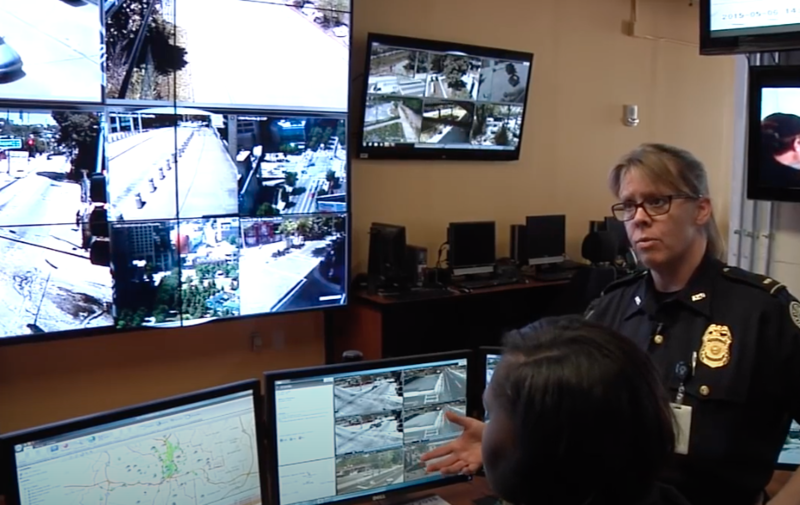Loudermilk/Operation Shield Video Integration Center
Atlanta Police Department
Atlanta, Georgia
Overview
The Atlanta Police Department’s Loudermilk Operation Shield Video Integration Center (VIC)—is a video surveillance program integrating both private and public cameras. The VIC has received more than $5 million in funding from various sources and combines access to automated license plate readers (ALPRs), predictive policing software, and real-time feeds from approximately 12,800 cameras.
Backstory
The VIC was launched in 2007 as part of the police department’s Operation Shield, a video camera integration network coordinated by the Atlanta Police Foundation and the Atlanta Police Department. In 2012, the VIC received $2.25 million, including $1.25 million from the U.S. Department of Homeland Security and $1 million from the family of local businessman Charlie Loudermilk.
Real-Time Crime Center Operations
Outside the Real-Time Crime Center
The VIC has access to approximately 12,800 cameras around Atlanta, including cameras maintained by public entities like neighboring local police departments, Hartsfield-Jackson International Airport, and the Atlanta Public Schools, as well as cameras owned by individuals or companies that have opted to link their systems to the city’s.
Privately-owned cameras make up the bulk of the system. Private individuals and entities are encouraged by VIC to make tax-deductible purchases of cameras or lease cameras through Georgia Power SiteView, a video surveillance service run by Georgia Power that is partnering with VIC. Private security guards can link to the police via the Atlanta Police Department’s Security Communication Network (ComNet), a two-way, UHF radio network.
The VIC operates at least 130 automated license plate readers.. Four higher-education institutions—Clark Atlanta University, Spelman College, Morehouse College, and the Morehouse School of Medicine—partnered to install $700,000 worth of cameras, including five ALPRs. These ALPRs are stationary and were placed at major intersections near the campuses.
Inside the Real-Time Crime Center
City-owned cameras are connected through Physical Security Integration Management (PSIM) software that compiles data points, alarms, and video feeds into one location. While police may access private camera feeds in real-time through the PSIM, the system does not record the video acquired from these cameras.
The Atlanta Police Department has been using PredPol at the VIC since 2013. This contract followed a 90-day pilot program that was run in two of their six zones.
“We push our crime numbers to PredPol every five minutes and, in turn, they give us eight hours of predictive analytics, which we inject into our PSIM at the VIC,” an APF official told Law Officer magazine in 2016. “So the officers that are in the VIC can see the boxes where crime is more likely to occur, and they are able to view the cameras that are in those areas and keep an eye out to hopefully keep crime from happening.”
The emergency calls are also integrated with data at the VIC, where officers monitor two screens showing camera feeds and a third screen that displays a rolling ticker of 911 calls. The Atlanta Police Department partnered with Google and Edge 360 in 2015 to connect its databases with those of other police agencies and integrate them into the VIC.
Uses and Controversies
One of the primary objectives of the real-time crime center is to monitor the large-scale public events in Atlanta, which was bolstered by a $350,000 injection of funds in 2016 for additional cameras and technology upgrades. In 2019, VIC was an integral part of the city's Super Bowl security strategy.
“The Video Integration Center has access to 12,800 cameras, of which probably 800 or 900 of those are city-owned. But the ones they use the most are the approximately 135 downtown. We’re going through the third generation of technology upgrades, and we're just completing those so the downtown area is really blanketed in cameras right now,” local official told Security Infowatch. “Especially around the events and the host hotels, the team hotels; all that's covered. We have license-plate readers everywhere now, we have topflight cameras with 360-coverage, pan, tilt, zoom on top of that.”
APD also used the VIC in investigating violent crime, such as an August 2019 shooting captured by a VIC-connected camera. Two suspects were arrested following a call to the public for tips.
The VIC has not been without its critics. For example, in 2019, Atlanta defense attorney Kim Frye voiced concerns about Operation Shield and the increased surveillance the VIC has brought to the city. “I often feel like we’re giving up lots of our freedoms for the illusion of security,” She told the Atlanta Journal-Constitution. “Is anybody worried about when the government, who knows where all these cameras are, just decides to take them over? It’s a slippery slope giving them all your information.”
Links
Security InfoWatch: Atlanta Ups Its Security Game for the Super Bowl
Reporter Newspapers: Installation of 50 new security cameras begins in Buckhead
Law Officer: How Atlanta PD Uses Surveillance Technology to Deter Crime
Reporter Newspapers: Atlanta invests $350,000 in Operation Shield video surveillance program
SmartCitiesWorld: Atlanta puts smart city tech to the test for Super Bowl
Atlanta Police Foundation: Operation Shield
PR Newswire: Georgia Power introduces SiteView™ video surveillance and security service
WSB-TV 2 News: Atlanta police's high-tech cameras helping catch criminals
WABE: New Cameras At Atlanta University Center Aim To Deter Crime
Atlanta Magazine: Predictive policing crime prevention software successful for APD
Last Updated Nov. 13, 2020




